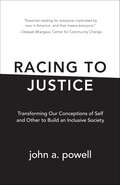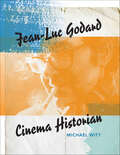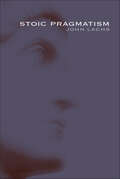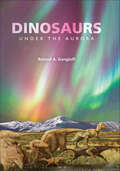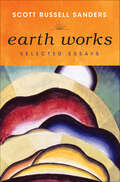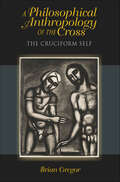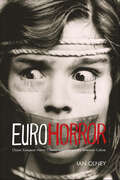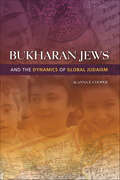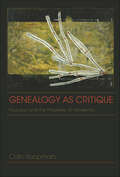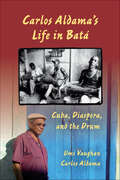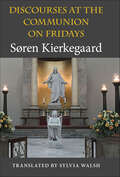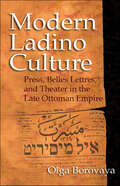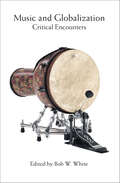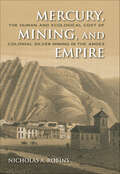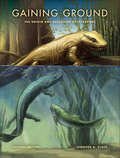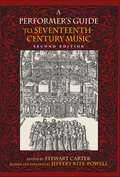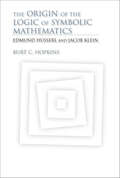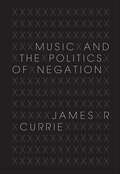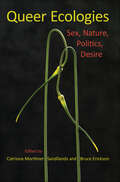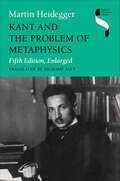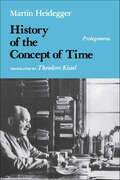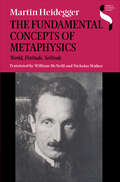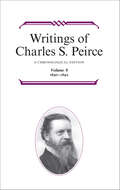- Table View
- List View
Racing to Justice: Transforming Our Conceptions of Self and Other to Build an Inclusive Society
by john a. powellRenowned social justice advocate john a. powell persuasively argues that we have not achieved a post-racial society and that there is much work to do to redeem the American promise of inclusive democracy. Culled from a decade of writing about social justice and spirituality, these meditations on race, identity, and social policy provide an outline for laying claim to our shared humanity and a way toward healing ourselves and securing our future. Racing to Justice challenges us to replace attitudes and institutions that promote and perpetuate social suffering with those that foster relationships and a way of being that transcends disconnection and separation.
Jean-Luc Godard, Cinema Historian
by Michael WittOriginally released as a videographic experiment in film history, Jean-Luc Godard's Histoire(s) du cinéma has pioneered how we think about and narrate cinema history, and in how history is taught through cinema. In this stunningly illustrated volume, Michael Witt explores Godard's landmark work as both a specimen of an artist's vision and a philosophical statement on the history of film. Witt contextualizes Godard's theories and approaches to historiography and provides a guide to the wide-ranging cinematic, aesthetic, and cultural forces that shaped Godard's groundbreaking ideas on the history of cinema.
Stoic Pragmatism (American Philosophy)
by John LachsJohn Lachs, one of American philosophy's most distinguished interpreters, turns to William James, Josiah Royce, Charles S. Peirce, John Dewey, and George Santayana to elaborate stoic pragmatism, or a way to live life within reasonable limits. Stoic pragmatism makes sense of our moral obligations in a world driven by perfectionist human ambition and unreachable standards of achievement. Lachs proposes a corrective to pragmatist amelioration and stoic acquiescence by being satisfied with what is good enough. This personal, yet modest, philosophy offers penetrating insights into the American way of life and our human character.
Dinosaurs Under the Aurora (Life of the Past)
by Roland A. GangloffIn 1961, while mapping rock exposures along the Colville River in Alaska, an oil company geologist would unknowingly find the evidence for a startling discovery. Long before the North Slope of Alaska was being exploited for its petroleum resources it was a place where dinosaurs roamed. Dinosaurs under the Aurora immerses readers in the challenges, stark beauty, and hard-earned rewards of conducting paleontological field work in the Arctic. Roland A. Gangloff recounts the significant discoveries of field and museum research on Arctic dinosaurs, most notably of the last 25 years when the remarkable record of dinosaurs from Alaska was compiled. This research has changed the way we think about dinosaurs and their world. Examining long-standing controversies, such as the end-Cretaceous extinction of dinosaurs and whether dinosaurs were residents or just seasonal visitors to polar latitudes, Gangloff takes readers on a delightful and instructive journey into the world of paleontology as it is conducted in the land under the aurora.
Earth Works: Selected Essays
by Scott Russell SandersIn the hands of award-winning writer Scott Russell Sanders, the essay becomes an inquisitive and revelatory form of art. In 30 of his finest essays—nine never before collected—Sanders examines his Midwestern background, his father's drinking, his opposition to war, his literary inheritance, and his feeling for wildness. He also tackles such vital issues as the disruption of Earth's climate, the impact of technology, the mystique of money, the ideology of consumerism, and the meaning of sustainability. Throughout, he asks perennial questions: What is a good life? How do family and culture shape a person's character? How should we treat one another and the Earth? What is our role in the cosmos? Readers and writers alike will find wisdom and inspiration in Sanders's luminous and thought-provoking prose.
A Philosophical Anthropology of the Cross: The Cruciform Self (Philosophy of Religion)
by Brian GregorWhat does the cross, both as a historical event and a symbol of religious discourse, tell us about human beings? In this provocative book, Brian Gregor draws together a hermeneutics of the self—through Heidegger, Gadamer, Ricoeur, and Taylor—and a theology of the cross—through Luther, Kierkegaard, Bonhoeffer, and Jüngel—to envision a phenomenology of the cruciform self. The result is a bold and original view of what philosophical anthropology could look like if it took the scandal of the cross seriously instead of reducing it into general philosophical concepts.
Euro Horror: Classic European Horror Cinema in Contemporary American Culture (New Directions in National Cinemas)
by Ian OlneyBeginning in the 1950s, "Euro Horror" movies materialized in astonishing numbers from Italy, Spain, and France and popped up in the US at rural drive-ins and urban grindhouse theaters such as those that once dotted New York's Times Square. Gorier, sexier, and stranger than most American horror films of the time, they were embraced by hardcore fans and denounced by critics as the worst kind of cinematic trash. In this volume, Olney explores some of the most popular genres of Euro Horror cinema—including giallo films, named for the yellow covers of Italian pulp fiction, the S&M horror film, and cannibal and zombie films—and develops a theory that explains their renewed appeal to audiences today.
Bukharan Jews and the Dynamics of Global Judaism (Sephardi and Mizrahi Studies)
by Alanna E. CooperPart ethnography, part history, and part memoir, this volume chronicles the complex past and dynamic present of an ancient Mizrahi community. While intimately tied to the Central Asian landscape, the Jews of Bukhara have also maintained deep connections to the wider Jewish world. As the community began to disperse after the fall of the Soviet Union, Alanna E. Cooper traveled to Uzbekistan to document Jewish life before it disappeared. Drawing on ethnographic research there as well as among immigrants to the US and Israel, Cooper tells an intimate and personal story about what it means to be Bukharan Jewish. Together with her historical research about a series of dramatic encounters between Bukharan Jews and Jews in other parts of the world, this lively narrative illuminates the tensions inherent in maintaining Judaism as a single global religion over the course of its long and varied diaspora history.
Genealogy as Critique: Foucault and the Problems of Modernity (American Philosophy)
by Colin KoopmanViewing Foucault in the light of work by Continental and American philosophers, most notably Nietzsche, Habermas, Deleuze, Richard Rorty, Bernard Williams, and Ian Hacking, Genealogy as Critique shows that philosophical genealogy involves not only the critique of modernity but also its transformation. Colin Koopman engages genealogy as a philosophical tradition and a method for understanding the complex histories of our present social and cultural conditions. He explains how our understanding of Foucault can benefit from productive dialogue with philosophical allies to push Foucaultian genealogy a step further and elaborate a means of addressing our most intractable contemporary problems.
Carlos Aldama's Life in Batá: Cuba, Diaspora, and the Drum
by Umi Vaughan Carlos AldamaBatá identifies both the two-headed, hourglass-shaped drum of the Yoruba people and the culture and style of drumming, singing, and dancing associated with it. This book recounts the life story of Carlos Aldama, one of the masters of the batá drum, and through that story traces the history of batá culture as it traveled from Africa to Cuba and then to the United States. For the enslaved Yoruba, batá rhythms helped sustain the religious and cultural practices of a people that had been torn from its roots. Aldama, as guardian of Afro-Cuban music and as a Santería priest, maintains the link with this tradition forged through his mentor Jesus Pérez (Oba Ilu), who was himself the connection to the preserved oral heritage of the older generation. By sharing his stories, Aldama and his student Umi Vaughan bring to light the techniques and principles of batá in all its aspects and document the tensions of maintaining a tradition between generations and worlds, old and new. The book includes rare photographs and access to downloadable audio tracks.
Discourses at the Communion on Fridays (Philosophy of Religion)
by Søren KierkegaardSøren Kierkegaard's 13 communion discourses constitute a distinct genre among the various forms of religious writing composed by Kierkegaard. Originally published at different times and places, Kierkegaard himself believed that these discourses served as a unifying element in his work and were crucial for understanding his religious thought and philosophy as a whole. Written in an intensely personal liturgical context, the communion discourses prepare the reader for participation in this rite by emphasizing the appropriate posture for forgiveness of sins and confession.
Modern Ladino Culture: Press, Belles Lettres, and Theater in the Late Ottoman Empire (Sephardi and Mizrahi Studies)
by Olga BorovayaOlga Borovaya explores the emergence and expansion of print culture in Ladino (Judeo-Spanish), the mother tongue of the Sephardic Jews of the Ottoman Empire, in the second half of the 19th and early 20th centuries. She provides the first comprehensive study of the three major forms of Ladino literary production—the press, belles lettres, and theater—as a single cultural phenomenon. The product of meticulous research and innovative methodology, Modern Ladino Culture offers a new perspective on the history of the Ladino press, a novel approach to the study of belles lettres in Ladino and their relationship to their European sources, and a fine-grained critique of Sephardic plays as venues for moral education and politicization.
Music and Globalization: Critical Encounters (Tracking Globalization)
by Bob W. White"World music" emerged as a commercial and musical category in the 1980s, but in some sense music has always been global. Through the metaphor of encounters, Music and Globalization explores the dynamics that enable or hinder cross-cultural communication through music. In the stories told by the contributors, we meet well-known players such as David Byrne, Peter Gabriel, Sting, Ry Cooder, Fela Kuti, and Gilberto Gil, but also lesser-known characters such as the Senegalese Afro-Cuban singer Laba Sosseh and Raramuri fiddle players from northwest Mexico. This collection demonstrates that careful historical and ethnographic analysis of global music can show us how globalization operates and what, if anything, we as consumers have to do with it.
Mercury, Mining, and Empire: The Human and Ecological Cost of Colonial Silver Mining in the Andes
by Nicholas A. RobinsOn the basis of an examination of the colonial mercury and silver production processes and related labor systems, Mercury, Mining, and Empire explores the effects of mercury pollution in colonial Huancavelica, Peru, and Potosí, in present-day Bolivia. The book presents a multifaceted and interwoven tale of what colonial exploitation of indigenous peoples and resources left in its wake. It is a socio-ecological history that explores the toxic interrelationships between mercury and silver production, urban environments, and the people who lived and worked in them. Nicholas A. Robins tells the story of how native peoples in the region were conscripted into the noxious ranks of foot soldiers of proto-globalism, and how their fate, and that of their communities, was—and still is—chained to it.
Gaining Ground: The Origin and Evolution of Tetrapods (Life of the Past)
by Jennifer A. ClackAround 370 million years ago, a distant relative of a modern lungfish began a most extraordinary adventure—emerging from the water and laying claim to the land. Over the next 70 million years, this tentative beachhead had developed into a worldwide colonization by ever-increasing varieties of four-limbed creatures known as tetrapods, the ancestors of all vertebrate life on land. This new edition of Jennifer A. Clack's groundbreaking book tells the complex story of their emergence and evolution. Beginning with their closest relatives, the lobe-fin fishes such as lungfishes and coelacanths, Clack defines what a tetrapod is, describes their anatomy, and explains how they are related to other vertebrates. She looks at the Devonian environment in which they evolved, describes the known and newly discovered species, and explores the order and timing of anatomical changes that occurred during the fish-to-tetrapod transition.
A Performer's Guide to Seventeenth-Century Music (Publications of the Early Music Institute)
by Jeffery Kite-PowellRevised and expanded, A Performer's Guide to Seventeenth Century Music is a comprehensive reference guide for students and professional musicians. The book contains useful material on vocal and choral music and style; instrumentation; performance practice; ornamentation, tuning, temperament; meter and tempo; basso continuo; dance; theatrical production; and much more. The volume includes new chapters on the violin, the violoncello and violone, and the trombone—as well as updated and expanded reference materials, internet resources, and other newly available material. This highly accessible handbook will prove a welcome reference for any musician or singer interested in historically informed performance.
The Origin of the Logic of Symbolic Mathematics: Edmund Husserl and Jacob Klein (Studies in Continental Thought)
by Burt C. HopkinsBurt C. Hopkins presents the first in-depth study of the work of Edmund Husserl and Jacob Klein on the philosophical foundations of the logic of modern symbolic mathematics. Accounts of the philosophical origins of formalized concepts—especially mathematical concepts and the process of mathematical abstraction that generates them—have been paramount to the development of phenomenology. Both Husserl and Klein independently concluded that it is impossible to separate the historical origin of the thought that generates the basic concepts of mathematics from their philosophical meanings. Hopkins explores how Husserl and Klein arrived at their conclusion and its philosophical implications for the modern project of formalizing all knowledge.
Music and the Politics of Negation (Musical Meaning and Interpretation)
by James R. CurrieOver the past quarter century, music studies in the academy have their postmodern credentials by insisting that our scholarly engagements start and end by placing music firmly within its various historical and social contexts. In Music and the Politics of Negation, James R. Currie sets out to disturb the validity of this now quite orthodox claim. Alternating dialectically between analytic and historical investigations into the late 18th century and the present, he poses a set of uncomfortable questions regarding the limits and complicities of the values that the academy keeps in circulation by means of its musical encounters. His overriding thesis is that the forces that have formed us are not our fate.
Playing on the Edge: Sadomasochism, Risk, and Intimacy
by Staci NewmahrRepresentations of consensual sadomasochism range from the dark, seedy undergrounds of crime thrillers to the fetishized pornographic images of sitcoms and erotica. In this pathbreaking book, ethnographer Staci Newmahr delves into the social space of a public, pansexual SM community to understand sadomasochism from the inside out. Based on four years of in-depth and immersive participant observation, she juxtaposes her experiences in the field with the life stories of community members, providing a richly detailed portrait of SM as a social space in which experiences of "violence" intersect with experiences of the erotic. She shows that SM is a recreational and deeply gendered risk-taking endeavor, through which participants negotiate boundaries between chaos and order. Playing on the Edge challenges our assumptions about sadomasochism, sexuality, eroticism, and emotional experience, exploring what we mean by intimacy, and how, exactly, we achieve it.
Queer Ecologies: Sex, Nature, Politics, Desire
by Catriona Mortimer-Sandilands and Bruce EricksonTreating such issues as animal sex, species politics, environmental justice, lesbian space and "gay" ghettos, AIDS literatures, and queer nationalities, this lively collection asks important questions at the intersections of sexuality and environmental studies. Contributors from a wide range of disciplines present a focused engagement with the critical, philosophical, and political dimensions of sex and nature. These discussions are particularly relevant to current debates in many disciplines, including environmental studies, queer theory, critical race theory, philosophy, literary criticism, and politics. As a whole, Queer Ecologies stands as a powerful corrective to views that equate "natural" with "straight" while "queer" is held to be against nature.
Kant and the Problem of Metaphysics (Studies in Continental Thought)
by Martin HeideggerSince its original publication in 1929, Martin Heidegger's provocative book on Kant's Critique of Pure Reason has attracted much attention both as an important contribution to twentieth-century Kant scholarship and as a pivotal work in Heidegger's own development after Being and Time. This fifth, enlarged edition includes marginal notations made by Heidegger in his personal copy of the book and four new appendices—Heidegger's postpublication notes on the book, his review of Ernst Cassirer's Philosophy of Symbolic Forms, Heidegger's response to reviews by rudolf Odebrecht and Cassirer, and an essay "On the History of the Philosophical Chair since 1866." The work is significant not only for its illuminating assessment of Kant's thought but also for its elaboration of themes first broached in Being and Time, especially the problem of how Heidegger proposed to enact his destruction of the metaphysical tradition and the role that his reading of Kant would play therein.
History of the Concept of Time: Prolegomena (Studies in Continental Thought)
by Martin HeideggerHeidegger's lecture course at the University of Marburg in the summer of 1925, an early version of Being and Time (1927), offers a unique glimpse into the motivations that prompted the writing of this great philosopher's master work and the presuppositions that gave shape to it. The book embarks upon a provisional description of what Heidegger calls "Dasein," the field in which both being and time become manifest. Heidegger analyzes Dasein in its everydayness in a deepening sequence of terms: being-in-the-world, worldhood, and care as the being of Dasein. The course ends by sketching the themes of death and conscience and their relevance to an ontology that makes the phenomenon of time central. Theodore Kisiel's outstanding translation premits English-speaking readers to appreciate the central importance of this text in the development of Heidegger's thought.
Hegel's Phenomenology of Spirit (Studies in Phenomenology & Existential Philosophy)
by Martin HeideggerThe text of Martin Heidegger's 1930-1931 lecture course on Hegel's Phenomenology of Spirit contains some of Heidegger's most crucial statements about temporality, ontological difference and dialectic, and being and time in Hegel. Within the context of Heidegger's project of reinterpreting Western thought through its central figures, Heidegger takes up a fundamental concern of Being and Time, "a dismantling of the history of ontology with the problematic of temporality as a clue." He shows that temporality is centrally involved in the movement of thinking called phenomenology of spirit.
The Fundamental Concepts of Metaphysics: World, Finitude, Solitude (Studies in Continental Thought)
by Martin Heidegger" . . an important addition to the translations of Heidegger's lecture-courses . . Heidegger's voice can be heard with few of the jolting Germanicisms with which so many translations of Heidegger's texts have been burdened. . . ." —International Philosophical Quarterly"The translators of these lectures have succeeded splendidly in giving readers an intimation of the tensely insistent tone of the original German. Heidegger's concern with a linguistic preconsciousness and with our entrancement before the enigma of existence remains intensely contemporary." —Choice"There is much that is new and valuable in this book, and McNeill and Walker's faithful translation makes it very accessible." —Review of Metaphysics"Whoever thought that Heidegger . . . has no surprises left in him had better read this volume. If its rhetoric is 'hard and heavy' its thought is even harder and essentially more daring than Heideggerians ever imagined Heidegger could be." —David Farrell KrellFirst published in German in 1938 as volume 29/30 of Heidegger's collected works, The Fundamental Concepts of Metaphysics includes an extended treatment of the history of metaphysics and an elaboration of a philosophy of life and nature. Heidegger's concepts of organism, animal behavior, and environment are uniquely developed and defined with intensity.This work, the text of Martin Heidegger's lecture course of 1929/30, is crucial for an understanding of Heidegger's transition from the major work of his early years, Being and Time, to his later preoccupations with language, truth, and history. First published in German in 1983 as volume 29/30 of Heidegger's collected works, The Fundamental Concepts of Metaphysics includes an extended treatment of the history of metaphysics and an elaboration of a philosophy of life and nature. Heidegger's concepts of organism, animal behavior, and environment are uniquely developed and defined with intensity.
Writings of Charles S. Peirce: A Chronological Edition (Writings of Charles S. Peirce)
by Charles S. PeirceVolume 8 of this landmark edition follows Peirce from May 1890 through July 1892—a period of turmoil as his career unraveled at the U.S. Coast and Geodetic Survey. The loss of his principal source of income meant the beginning of permanent penury and a lifelong struggle to find gainful employment. His key achievement during these years is his celebrated Monist metaphysical project, which consists of five classic articles on evolutionary cosmology. Also included are reviews and essays from The Nation in which Peirce critiques Paul Carus, William James, Auguste Comte, Cesare Lombroso, and Karl Pearson, and takes part in a famous dispute between Francis E. Abbot and Josiah Royce. Peirce's short philosophical essays, studies in non-Euclidean geometry and number theory, and his only known experiment in prose fiction complete his production during these years.Peirce's 1883-1909 contributions to the Century Dictionary form the content of volume 7 which is forthcoming.
